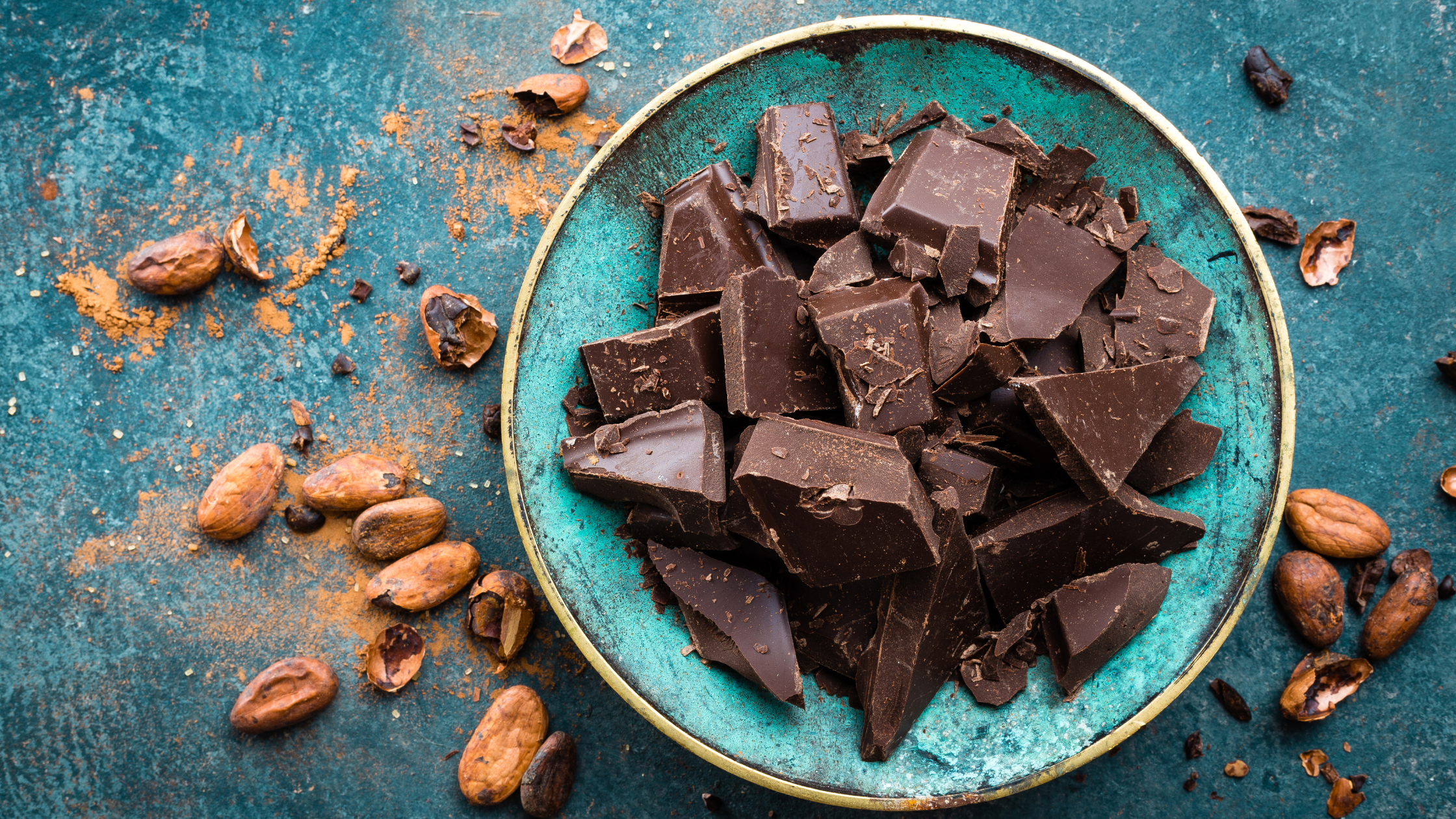
Chocolate, often considered a delectable treat and indulgence, has been enjoyed for centuries. Beyond its irresistible taste, numerous studies suggest that chocolate, especially dark chocolate, comes with a host of health benefits that may surprise many. While moderation is key, let’s unwrap the goodness within and explore the various ways chocolate can contribute to our well-being.
Dark chocolate contains a decent amount of soluble fiber and is loaded with minerals. Chocolate, especially dark chocolate, is a good source of essential minerals such as magnesium, copper, and iron. Magnesium is crucial for muscle and nerve function, copper supports the formation of red blood cells, and iron is essential for oxygen transport in the body needed for energy. Including chocolate in a balanced diet can contribute to meeting the body’s mineral requirements.
A 100-gram bar of dark chocolate with 70–85% cocoa contains
- 11 grams of fiber
- 66% of the DV for iron
- 57% of the DV for magnesium
- 196% of the DV for copper
- 85% of the DV for manganese
- In addition, it has plenty of potassium, phosphorus, zinc, and selenium.
Of course, 100 grams (3.5 ounces) is a fairly large amount and not something you should be consuming daily but this does give you some idea of what nutrients go into these dark delectables.
1. Rich in Antioxidants:
Chocolate, particularly dark chocolate, is a potent source of antioxidants. These compounds help combat oxidative stress in the body, neutralizing free radicals and reducing the risk of chronic diseases. The presence of flavonoids in cocoa, a key component of chocolate, has been linked to improved heart health and a reduced risk of cardiovascular issues. One study showed that cocoa and dark chocolate had more antioxidant activity, polyphenols, and flavanols than any other fruits tested, which included blueberries and acai berries (1)
2. Heart Health:
Several studies have shown that moderate consumption of dark chocolate may contribute to heart health. Dark chocolate has been associated with improvements in blood flow, reduced blood pressure, and enhanced cholesterol levels. (2) Flavonoids in chocolate are believed to have a positive impact on endothelial function, promoting healthy blood vessels and reducing the risk of heart disease. These include polyphenols, flavanols and catechins, among others. According to research, the polyphenols in dark chocolate may help lower some forms of LDL (“bad”) cholesterol when combined with other foods like almonds and cocoa, which makes sense as who doesn’t love dark chocolate covered almonds. (3)
A review of studies revealed that eating chocolate 3 times per week lowered the risk of cardiovascular disease by 9%. (4)
3. Mood Enhancement:
Chocolate contains various compounds that stimulate the production of endorphins, the “feel-good” hormones in the brain. Additionally, chocolate contains a small amount of caffeine, which can provide a mild energy boost and enhance alertness. Phenylethylamine, another compound found in chocolate, is believed to mimic the mood-enhancing effects of endorphins and may contribute to an improved sense of love and well being. In one large study of 13,000 people, those who ate dark chocolate in the previous 24 hours were 70% less likely to report depression. And it didn’t take much, just 12 grams of dark chocolate was enough to elicit this effect. That’s just 2 or 3 of these treats! (5)
4. Brain Function:
Cocoa, a primary ingredient in chocolate, contains flavonoids that may have neuroprotective effects. Research suggests that regular consumption of chocolate may improve cognitive function and protect against age-related decline. (6) Cocoa contains stimulant substances like caffeine and theobromine, which may be a key reason why it can improve brain function including enhanced memory, attention, and problem-solving skills. (7) Studies show that eating high flavanol cocoa can improve blood flow to the brain in young adults. This may explain why eating cocoa daily appears to improve attention, verbal learning, and memory. (8)
5. Stress Reduction:
Consuming chocolate may have stress-relieving effects. The combination of compounds like serotonin precursors, theobromine, and magnesium can contribute to relaxation and reduced stress levels. While chocolate is not a cure for stress, it can be a delightful and comforting treat that provides a momentary sense of relaxation.
Want a nice chocolate treat?
You can just consume a coupe of pieces of dark chocolate 75% or more each day, grate it on your yogurt or oatmeal, or include it in your trail mix. But for some more options check out our chocolate almond butter cup or chocolate coffee shake recipes.
While it’s important to consume chocolate in moderation, the health benefits associated with its consumption, especially dark chocolate, are increasingly supported by scientific research. From heart health to mood enhancement and cognitive function, chocolate contains a rich blend of compounds that can contribute positively to our overall well-being. So, the next time you savor a piece of chocolate, know that you may be indulging in more than just a delightful treat – you’re unwrapping a host of potential health benefits.
References
- https://bmcchem.biomedcentral.com/articles/10.1186/1752-153X-5-5
- https://pubmed.ncbi.nlm.nih.gov/22301923/
- https://www.ahajournals.org/doi/10.1161/jaha.116.005162#d3e3715
- https://www.ncbi.nlm.nih.gov/pmc/articles/PMC5537803/
- https://www.psychiatrictimes.com/view/dark-chocolate-depression
- https://www.ncbi.nlm.nih.gov/pmc/articles/PMC6571795/
- https://www.ncbi.nlm.nih.gov/pmc/articles/PMC4335269/
- https://www.ncbi.nlm.nih.gov/pmc/articles/PMC7760676/





